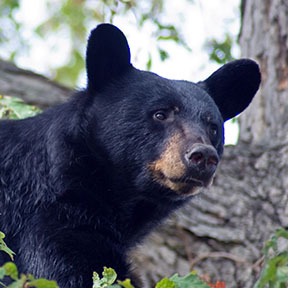Displaying items by tag: north carolina wildlife resources commission
Ela dam removal proceeds to make a river run through
 Ela Dam on the Oconaluftee River in Cherokee. The dam is slated for removal to benefit aquatic species and the Eastern Band of the Cherokee Indians. Erin McCombs
Ela Dam on the Oconaluftee River in Cherokee. The dam is slated for removal to benefit aquatic species and the Eastern Band of the Cherokee Indians. Erin McCombs
Ela Dam Removal Coalition moving forward after $4 million grant from U.S. Fish and Wildlife to commence river restoration project
Erin McCombs is the Southeast Conservation Director of American Rivers.
CHEROKEE — American Rivers is working with a team on a massive effort to remove the Ela dam and restore the land and Oconaluftee River to its natural condition. Partnering with the Eastern Band of Cherokee Indians (EBCI), American Rivers is part of a coalition of federal, state, public, private, and non-profit organizations that has formed to remove the Ela dam.
Truly a village effort, the Ela Dam Coalition includes the EBCI, American Rivers, Mainspring Conservation Trust, the North Carolina Wildlife Resources Commission, the U.S. Fish and Wildlife Service, the Southern Environmental Law Center, the Environmental Protection Agency, American Whitewater, Swain County, the Army Corps of Engineers, and Northbrook Carolina Hydro II.
“Healthy rivers are essential to all life, and removing a dam is the fastest way to restore a river’s health. We appreciate this initial investment by U.S. Fish and Wildlife Service in the restoration of the Oconaluftee River. We look forward to working with them to leverage this investment to fully realize this project to revitalize fish and wildlife habitat and restore vital cultural connections. We are grateful to the Eastern Band of Cherokee Indians for their leadership, and for the partnership of Mainspring Conservation Trust,” said Tom Kiernan, American Rivers President and CEO.
Blocking the Oconaluftee River’s natural flow impacts the aquatic habitats of many native fish, mussels, birds, and other wildlife which require it for sheltering, feeding, reproducing, and thriving in their natural environment. The removal of Ela dam will result in a cultural reconnection of the Oconaluftee River to the Cherokee people and the Qualla Boundary.
The Oconaluftee River is home to 11 sensitive and rare aquatic species, some of which are only found in a few streams and rivers in western North Carolina, including the federally endangered Appalachian elktoe freshwater mussel, the Sicklefin Redhorse (NC Threatened), and Eastern Hellbender (NC Special Concern). Once complete, 549 miles of the Oconaluftee River watershed will be restored and expand habitat for these species.
- american rivers
- ela dam
- eastern band of cherokee indians
- ela dam coalition
- mainspring conservation trust
- north carolina wildlife resources commission
- us fish and wildlife service
- southern environmental law center
- oconaluftee river
- joey owle
- environmental protection agency
- american whitewater
- swain county
- army corps of engineers
- northbrook carolina hydro ii
- bryson city
- sicklefin redhorse
- eastern hellbender
- appalachian elktoe
Mountain bears in crosshairs of NC sanctuary management plan
 North Carolina Wildlife Resources Commission
North Carolina Wildlife Resources Commission
Smoky Mountain News: WNC bear-management plan raises some hackles
State wildlife officials in North Carolina are proposing a rule change that would allow hunters to kill black bears in areas that are currently off-limits to “harvesting” of the animals.
The North Carolina Wildlife Resources Commission cites the population boom of the bruins in its consideration of opening up permit hunting in sanctuaries such as Panthertown, Standing Indian and Pisgah.
The proposal is among changes to state wildlife law suggested by the commission for 2022-2023 hunting seasons.
“Allowing hunting in additional sanctuaries will help control the growing population as increased human development reduces hunter access outside the sanctuaries, the Wildlife Commission says, and it will also cut down on human-bear conflicts in those areas,” according to reporting from Holly Kays of Smoky Mountain News.
An outline and rationale for the bear sanctuary hunting rule is available on the North Carolina Wildlife Resource Commission website.
Limbless bears break hearts but donuts may be worse than leg traps
 Courtesy of Help Asheville Bears
Courtesy of Help Asheville Bears
By any other name: From poaching to cars and traps, black bears face diverse human threats in Southern Appalachians
Activists and state agencies agree bear poaching is an age-old problem in the mountains of Tennessee and North Carolina, but they diverge when it comes to some key aspects of the crime and its prevention.
The non-profit Help Asheville Bears is raising awareness of threats to bears on both sides of the state lines and getting coverage on local media outlets like this piece on Knoxville-based WBIR. Its message has also appeared on a billboard in Sevierville. The Arden, N.C.-based group offers a tip line, rewards and also supports what could be described as a self-styled anti-poaching militia.
“Bear poaching is a big deal. It happens anywhere where there are bears,” said Jody Williams, the founder of Help Asheville Bears, which is responding to what its members see as an increasing threat to the very symbol of wild Southern Appalachia. HAB is especially concerned about trapping that Williams said has left limbless bears limping throughout the mountains.
- bear poaching
- smoky mountains bear poaching
- limbless bear
- legless bear
- save asheville bears
- twra bear
- bear trap
- trap sold on amazon
- poacher strike force
- help asheville bear
- leg trap
- leg trap amazon petition
- danger to bear
- don't feed bear
- bearwise
- tennesse wildlife resources agency
- north carolina wildlife resources commission
- black bear